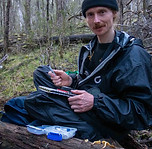The AMS Student Travel Award
The 2023 AMS Student Travel Award application is now closed.
We are offering Travel Awards of up to $500 AUD for students to attend the Biosystematics 2023 meeting at the Australian National University in Canberra, 26 – 30 November 2023.
Applicants must be:
-
AMS members or must have applied for membership at the time of application
-
Registering to the Biosystematics 2023 meeting as a student
-
Presenting a talk at the Biosystematics 2023 meeting [All award winners will receive an oral presentation slot in the program]
Documents Required:
-
Abstract of the talk
-
A short CV (maximum 2 pages) that includes:
o Name, contact address, email and phone number
o Summary of research interests
o Education and professional history
o Publications and other significant professional output (if available)
o Previous awards and honors (if available)
o Service (if available)
-
Budget to attend the meeting
-
Confirmation of membership to the AMS
To Apply:
Submit the documents in one PDF file by email to ausmycsoc@gmail.com by Aug 20, 2023.
Applicants will be notified by email regarding the outcome of their application within approximately 3 weeks, in time to register for the Biosystematics 2023 meeting.
Any enquiries can be directed to ausmycsoc@gmail.com
Award Terms:
-
All awardees must provide a short biography (100-200 words) and a photo within two weeks of notification, to be featured in the AMS newsletter.
-
The award check must be deposited or cashed within 3 months.
-
Each awardee will contribute a short article about their experience at the conference to the AMS newsletter and/or present their findings at the AMS virtual seminars, within a year of receiving the award. This will be a great opportunity to promote your research to the AMS community.
-
Recipients of the AMS Student Travel Award
2023

Luke Vaughan
Royal Botanic Gardens Victoria
Studies on Hodophilus: documenting Australia’s little brown mushrooms
Talk Summary
Documenting species is critical for understanding biological diversity and facilitating research on the biology and ecology of organisms. Hodophilus is a genus of agaricoid fungi characterised by dull basidiomes with decurrent, widely spaced lamellae, a wax-like appearance and white spores. So far, little is known of Hodophilus in Australia and species are yet to be described. Preliminary molecular and morphological analysis of unidentified collections in herbaria and microscopic examination of collections assigned to the sister genus Camarophyllopsis indicate there may be at least two, and possibly four different species occurring in Australia. With the most commonly encountered putative species being a classic LBM – or “little brown mushroom” - Hodophilus specimens may be easily overlooked in the field. However, citizen science has already played a large role in identifying hotspots of diversity for this genus in Australia. This talk will summarise the current knowledge of the diversity of Hodophilus in Australia and report on the progress of describing novel species.
